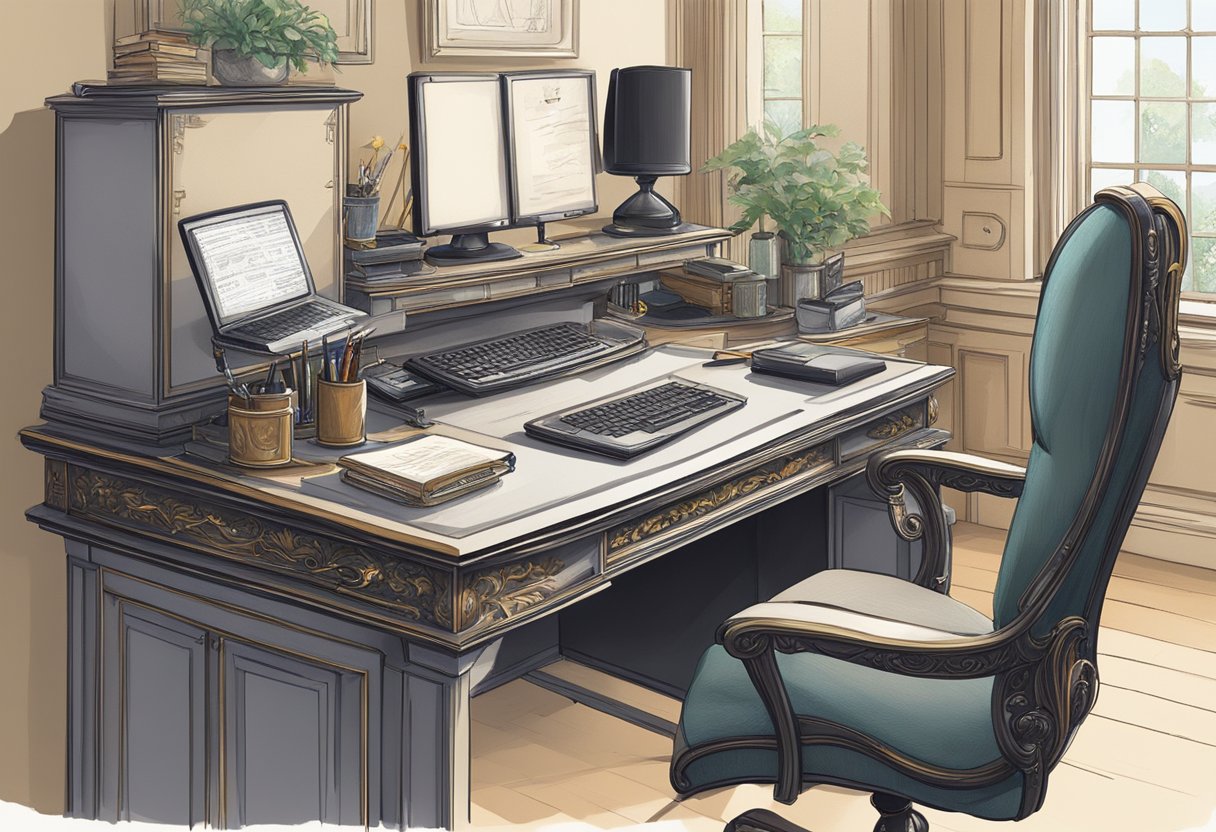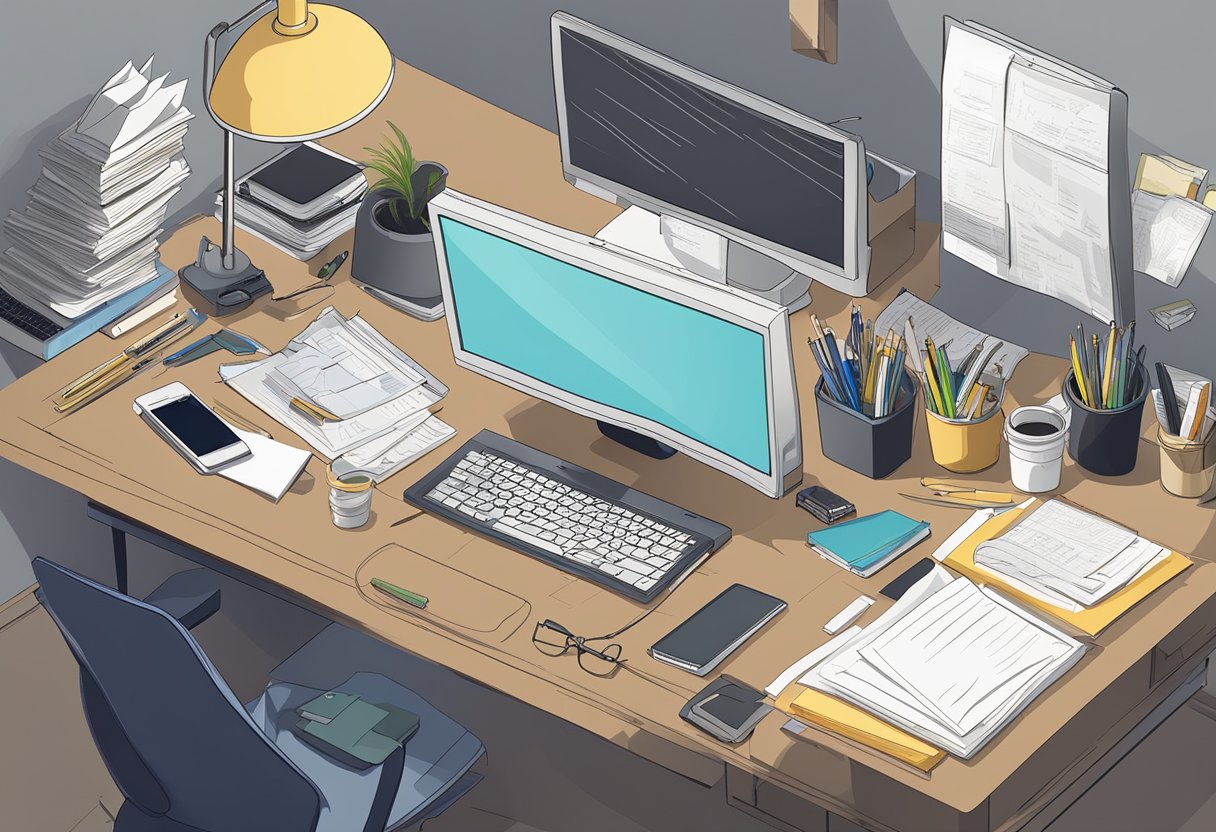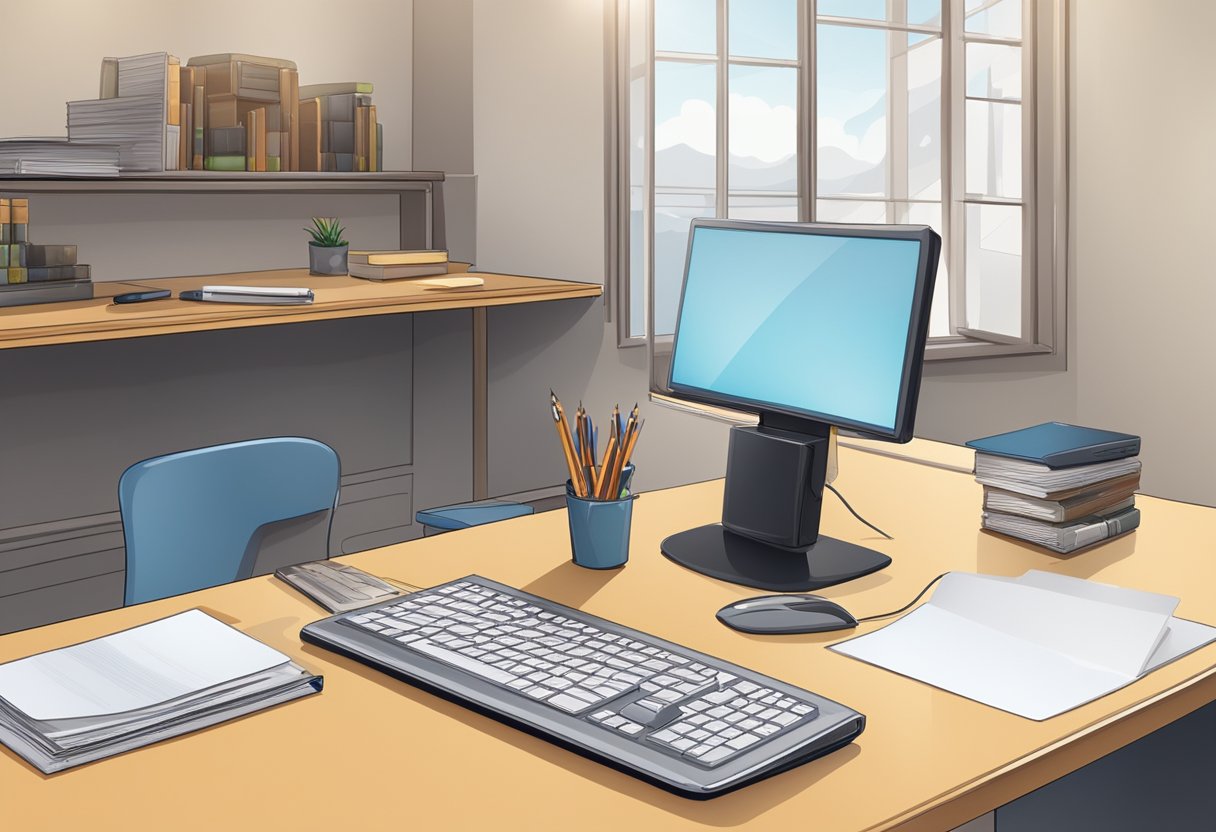- You are here:
- Home »
- Desk Comparisons »
- Writing Desk vs Computer Desk: Which is the Better Choice for Your Home Office?
Writing Desk vs Computer Desk: Which is the Better Choice for Your Home Office?
As an Amazon Associate I earn from qualifying purchases.
When it comes to setting up a workspace, one of the most important decisions you’ll make is choosing the right desk. There are many factors to consider, including size, style, and functionality. But one of the most fundamental choices you’ll make is whether to opt for a writing desk or a computer desk.

A writing desk is a classic piece of furniture that has been used for centuries. It’s typically a simple, sturdy table with a flat surface and a few drawers for storage. Writing desks are designed for, as their name suggests, writing. They’re perfect for tasks like letter-writing, journaling, or sketching. On the other hand, a computer desk is designed specifically for computer use. It’s usually larger than a writing desk, with ample space for a monitor, keyboard, mouse, and other peripherals. It may also have features like cable management, built-in power strips, and adjustable height settings.
So which type of desk is right for you? That depends on a variety of factors, including your work habits, your workspace, and your personal style. In this article, we’ll explore the differences between writing desks and computer desks and help you decide which one is the best fit for your needs. We’ll also provide tips on how to care for and maintain your desk, as well as answer some frequently asked questions about desk selection and use.
Key Takeaways
- Writing desks are simple, sturdy tables designed for writing tasks, while computer desks are larger and designed specifically for computer use.
- When choosing a desk, consider your work habits, workspace, and personal style.
- Proper care and maintenance of your desk can help extend its lifespan.
Understanding Writing and Computer Desks

If you are looking to set up a workspace at home or in the office, you may be wondering whether to go for a writing desk or a computer desk. Both have their advantages and disadvantages, and it ultimately comes down to your needs and preferences. In this section, we will discuss the key features of writing desks and computer desks to help you make an informed decision.
Key Features of Writing Desks
Writing desks are typically designed for traditional writing tasks such as letter writing, journaling, or drawing. They are often smaller in size and have fewer compartments and storage options compared to computer desks. Here are some key features of writing desks:
- Work surface: Writing desks usually have a flat work surface that is spacious enough for writing or drawing. They may have a pull-out tray for a keyboard or laptop, but it is not the main feature of the desk.
- Material: Writing desks can be made of various materials, including wood, glass, metal, or a combination of these. Wood is a popular choice for a traditional look, while glass can give a modern feel.
- Drawers and shelves: Writing desks may have a few drawers or shelves for storing writing supplies, but they are not designed for extensive storage.
- Style: Writing desks come in various styles, from antique to contemporary. They can add a touch of elegance and sophistication to your workspace.
Key Features of Computer Desks
Computer desks are designed specifically for computer work, whether it’s a desktop or a laptop. They usually have more storage options and compartments than writing desks. Here are some key features of computer desks:
- Work surface: Computer desks have a flat work surface that is spacious enough for a computer monitor, keyboard, and mouse. Some computer desks have a separate work surface for the keyboard and mouse.
- Storage space: Computer desks often have several compartments and shelves for storing a desktop computer, peripherals, and other office supplies. Some computer desks have a hutch for additional storage space.
- Cable management: Computer desks have built-in cable management systems to keep cords and cables organized and out of sight.
- Ergonomics: Computer desks are designed with ergonomics in mind, with features such as adjustable height, keyboard tray, and monitor stand to promote good posture and reduce strain on your eyes, neck, and back.
Whether you choose a writing desk or a computer desk, make sure it is sturdy, stable, and comfortable to use. Consider your workspace, storage needs, and budget when making your decision.
Choosing the Right Desk for Your Needs
https://www.youtube.com/watch?v=WLv6tK-_N5c&embed=true
When it comes to choosing the right desk for your needs, there are a few things to consider. The type of desk you choose will depend on what you plan to use it for, as well as your personal preferences.
For Home Use
If you’re looking for a desk for home use, you might want to consider a writing desk or a computer desk. Writing desks are great for those who like to write, while computer desks are perfect for those who use a desktop computer or laptop.
When choosing a desk for home use, it’s important to consider the amount of storage space you need. Make sure the desk has enough space for your computer, keyboard, and any other accessories you might need. If you need extra storage space, look for a desk with drawers or shelves.
For Office Use
If you’re looking for a desk for office use, you might want to consider an executive desk or an L-shaped desk. These desks are spacious and provide plenty of room for a desktop computer, keyboard, and other peripherals.
When choosing a desk for office use, it’s important to consider your posture and comfort. Look for a desk with a keyboard tray and adjustable height to ensure that you can work comfortably for long periods of time.
For Gaming Use
If you’re looking for a desk for gaming use, you might want to consider a gaming desk or a standing desk converter. Gaming desks are designed to provide ample space for your gaming setup, including your monitor, keyboard, and mouse. Standing desk converters allow you to switch between sitting and standing while gaming, which can help improve your posture and reduce fatigue.
When choosing a desk for gaming use, it’s important to consider cable management and stability. Look for a desk with plenty of space for cables and accessories, as well as a sturdy and stable design to support your gaming setup.
Remember, choosing the right desk for your needs is all about finding the right balance between productivity, organization, and comfort. Take your time and consider all of your options before making a decision.
Care and Maintenance of Desks

Whether you have a writing desk or a computer desk, it is important to take proper care of your workspace to ensure it lasts for years to come. Here are some tips to help you maintain your desk:
Keep it Clean
Regularly wipe down your desk with a damp cloth to remove any dust or dirt. For tougher stains, use a mild cleaning solution and avoid harsh chemicals that could damage the material of your desk.
Organize Your Storage Space
If your desk has drawers, shelves, or compartments, make sure to keep them organized. Avoid overloading them with heavy items that could cause damage or make it difficult to access your belongings.
Manage Your Cables
For computer desks, cable management is important to avoid clutter and potential hazards. Use cable ties or clips to keep your cables organized and out of the way.
Check for Stability
Make sure your desk is stable and sturdy. If it wobbles or feels unsteady, tighten any loose screws or bolts. If the problem persists, consider replacing the desk.
Consider Ergonomics
If you spend a lot of time at your desk, consider investing in an ergonomic chair and keyboard tray to maintain good posture and prevent strain on your back and wrists.
By following these tips, you can keep your writing desk or computer desk in top condition and create a comfortable and productive workspace.
Frequently Asked Questions

What are the advantages of a writing desk over a computer desk?
A writing desk is designed for writing, drawing, or reading. It typically has a large flat surface, which provides ample space for spreading out papers and books. Writing desks also tend to be more stylish and elegant than computer desks, making them a great addition to any room. They are often made from high-quality materials, such as hardwoods, and can last for generations.
What are the disadvantages of a computer desk compared to a writing desk?
Computer desks are designed specifically for computer use, which means they may not be as versatile as writing desks. They often have limited space for writing or reading, and may not be as aesthetically pleasing as writing desks. Additionally, computer desks may be more expensive than writing desks, especially if they have advanced features such as built-in power outlets or cable management systems.
Can a writing desk function as a suitable computer desk?
Yes, a writing desk can function as a suitable computer desk, especially if you only use your computer for basic tasks such as email and web browsing. However, you may need to make some modifications to the desk, such as adding a keyboard tray or a monitor stand, to make it more comfortable for extended computer use.
What distinguishes a computer desk from an executive desk?
An executive desk is typically larger and more ornate than a computer desk. It is designed to convey a sense of power and authority, and may have features such as a built-in bookcase or a leather writing surface. A computer desk, on the other hand, is designed specifically for computer use, and may have features such as a keyboard tray or a cable management system.
What are the benefits of a secretary desk over a computer desk?
A secretary desk is a type of writing desk that has a hinged writing surface that can be closed to conceal papers and books. This makes it a great option for people who want to keep their workspace tidy and organized. Additionally, secretary desks often have built-in storage compartments for pens, paper, and other office supplies.
What is the proper name for a writing desk?
The proper name for a writing desk is simply “writing desk.” However, there are many different types of writing desks, including secretary desks, roll-top desks, and campaign desks, each with their own unique features and design elements.
Amazon and the Amazon logo are trademarks of Amazon.com, Inc, or its affiliates.
Related Posts
03 Dec, 2023How to Organize Papers Without a Filing Cabinet: Simple Tips and Tricks
03 Dec, 2023Does a Corner Desk Have to Be in a Corner? Exploring the Placement Options
21 Nov, 2023L-Shaped Desk vs Straight Desk: Which is the Better Choice for Your Workspace?
21 Nov, 2023Are Corner Desks More Ergonomic? A Comprehensive Analysis
21 Nov, 2023L Shaped Desk vs Corner Desk: Which is the Best for Your Workspace?

